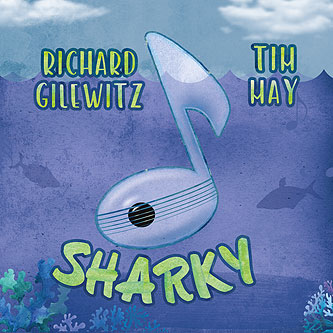 A
meeting of the minds guitar album by two versatile acoustic music
mavens, Sharky is quite a fantastic and highly entertaining
recording of instrumental fretboard magic. Florida-based Richard
Gilewitz has released an impressive repertoire of acoustic instrumental
guitar recordings, while guitar / mando / dobro ace Tim May
is also a highly regarded musician and recording artist based in Nashville.
For their joint album from 2018, Sharky is short but sweet—its
eight tracks representing a splendid cross section of original songs
and several surprising cover versions that prove to work quite well
as pop songs done instrumentally by two players who truly know their
stuff. Notable are covers of Johnny Smith’s “Walk Don’t
Run”, which is also the same song The Ventures turned the world
on to as a surf-rock instrumental back in 1960. “Bye Bye Blackbird”
is a track that everyone knows and Leonard Cohen’s “Hallelujah”
is one that everyone might not know but should, as it’s a heart-tugging
song that also works wonders as an instrumental on Sharky. The
title track “Sharky” was composed by Tim, Richard and Mike
Laidly and is one of the best guitar instrumentals on the album and
truth be told, it's one of the best guitar instrumentals of the past
year. Speaking about this first-ever duo album release from Richard
and Tim, on the GillaZilla Records label, Richard tells mwe3.com,
"Pretty much anything Tim elects to do on a tune with his
choice of instruments improves everything. He has about the best musical
ear of anyone I've ever played with and understands how to use restraint,
capture and mirror or react to a melody or groove so I bow down to
him for that." One could only hope that Richard and Tim build
upon their worthy efforts on Sharky with a follow up disc.
Acoustic instrumental guitar / mandolin music played with the utmost
precision and respect, Sharky is among the most engaging releases
of late 2018 into early 2019. www.richardgilewitz.com
/ www.timmaymusic.net
A
meeting of the minds guitar album by two versatile acoustic music
mavens, Sharky is quite a fantastic and highly entertaining
recording of instrumental fretboard magic. Florida-based Richard
Gilewitz has released an impressive repertoire of acoustic instrumental
guitar recordings, while guitar / mando / dobro ace Tim May
is also a highly regarded musician and recording artist based in Nashville.
For their joint album from 2018, Sharky is short but sweet—its
eight tracks representing a splendid cross section of original songs
and several surprising cover versions that prove to work quite well
as pop songs done instrumentally by two players who truly know their
stuff. Notable are covers of Johnny Smith’s “Walk Don’t
Run”, which is also the same song The Ventures turned the world
on to as a surf-rock instrumental back in 1960. “Bye Bye Blackbird”
is a track that everyone knows and Leonard Cohen’s “Hallelujah”
is one that everyone might not know but should, as it’s a heart-tugging
song that also works wonders as an instrumental on Sharky. The
title track “Sharky” was composed by Tim, Richard and Mike
Laidly and is one of the best guitar instrumentals on the album and
truth be told, it's one of the best guitar instrumentals of the past
year. Speaking about this first-ever duo album release from Richard
and Tim, on the GillaZilla Records label, Richard tells mwe3.com,
"Pretty much anything Tim elects to do on a tune with his
choice of instruments improves everything. He has about the best musical
ear of anyone I've ever played with and understands how to use restraint,
capture and mirror or react to a melody or groove so I bow down to
him for that." One could only hope that Richard and Tim build
upon their worthy efforts on Sharky with a follow up disc.
Acoustic instrumental guitar / mandolin music played with the utmost
precision and respect, Sharky is among the most engaging releases
of late 2018 into early 2019. www.richardgilewitz.com
/ www.timmaymusic.net
mwe3.com presents an interview with
RICHARD GILEWITZ and TIM MAY
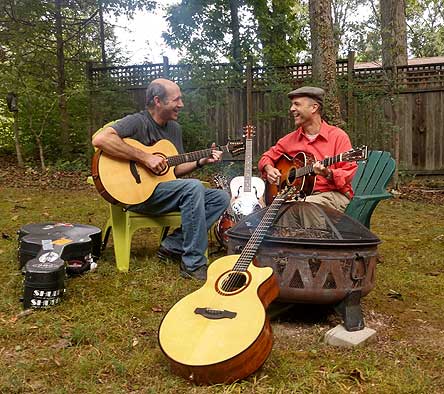 mwe3:
My favorite track on Sharky is the title track, which is one
of the coolest acoustic guitar instrumentals ever written. You wrote
it with Mike Laidley too? So “Sharky”, the song was written
by three musicians?
mwe3:
My favorite track on Sharky is the title track, which is one
of the coolest acoustic guitar instrumentals ever written. You wrote
it with Mike Laidley too? So “Sharky”, the song was written
by three musicians?
Richard Gilewitz: The track “Sharky” was originally
written by Tim May and Mike Laidley and I just had a rough recorded
version of what they had come up with one night. That sat around for
a while and I recall Tim and I trying to work it out in my backyard.
Can't speak for Tim but I felt like I was forcing it. So I waited.
One day while laying on the couch the bridge section almost came out
of my hands in one motion and it appeared. I attribute this to hours
of listening to it over a long time and it just felt like the missing
puzzle piece. I was relieved when I discovered that Tim liked it and
we went from there. One of the most infectious tunes on the CD for
me…
Tim May: One way that I have always enjoyed co-writing is to
have one guy come up with a melody, maybe the main theme or ‘A’
part and then pass it on to somebody else to write a ‘B’
part or chorus or bridge or whatever you want to call it, then both
parties come together to fine tune it and finish it. That’s what
happened with “Simpleton”… Richard had the main theme,
I had the bridge, and "Sharky", Mike Laidley and I wrote
the theme together and Richard wrote the bridge. Those two tunes were
both written within a year of recording them. Are you prepared for
the disappointment? We finished the tune and there was a Shark vacuum
cleaner sitting there by the table so “Sharky” came out
of somebody’s mouth: after toiling artistically for the whole
evening we just didn’t have any ‘art’ left to devote
to a creative name so that’s what we ended up with. Yes, it’s
a three-way write.
 mwe3:
How about “Mr. Simpleton’s Little Red Shoes”? Interesting
title! When is that one from? You say that’s an original and
a co-write too?
mwe3:
How about “Mr. Simpleton’s Little Red Shoes”? Interesting
title! When is that one from? You say that’s an original and
a co-write too?
Richard Gilewitz: Tim, Gretchen and I play almost every year
in a school program for the children of Rock Springs Wyoming in December…
that's right, Wyoming in December! When we were setting up in a gymnasium
I was knocking out the licks for the opening just as a sort of warm
up and it got Tim’s attention. That night we worked on it together
in the hotel and hashed out a bridge section he had in mind and I
went to work on fine tuning a few picking patterns in an attempt to
avoid predictability but stay with the melodic theme he had in mind.
As Tim said "I 'Gilewized' it!" The title amuses
me because when I originally recorded the original theme on my phone
I came up with the title realizing that it has absolutely no meaning
at all, references nothing, and I am utterly clueless where it came
from. I just found it amusing and it stuck!
 mwe3:
What makes the combination of acoustic guitar and mandolin such a
unique sound in your estimation? What guitars, mandolin and dobro
are you guys playing on the Sharky CD and do you have any endorsements
on guitars and other musical gear?
mwe3:
What makes the combination of acoustic guitar and mandolin such a
unique sound in your estimation? What guitars, mandolin and dobro
are you guys playing on the Sharky CD and do you have any endorsements
on guitars and other musical gear?
Richard Gilewitz: Pretty much anything Tim elects to do on
a tune with his choice of instruments improves everything. He has
about the best musical ear of anyone I've ever played with and understands
how to use restraint, capture and mirror or react to a melody or groove
so I bow down to him for that. My endorsements are currently with
D'Addario strings, LR Baggs, Shubb capos, Mel Bay publications, TrueFire
and Wolfram Slides. In the past I have been a clinician and sponsored
by Peavey electronics, Tacoma guitars and Breedlove guitars.
Tim May: Yes, endorsements with Preston Thompson guitars, Collings
mandos, and I endorse my own Resophonic guitar (dobro) that I made,
the ResoMay. Other endorsements LR Baggs, Shubb capos. Since a lot
of the arrangements stand alone, I’m always trying to just embellish
and not distract. Mandolin tends to accomplish this easier than guitar
for the obvious reason that Richard is already playing guitar. Since
he normally plays by himself, it is somewhat of a formulae I use to
let him play how he normally would without changing much to accommodate
me and that’s why a lot of what you hear on the album sounds
like I am echoing what he is doing, almost a call-and-response approach.
mwe3: “Walk Don’t Run” is a standard that’s
been covered by so many artists over the decades. In what ways did
you decide to put a new spin on that track?
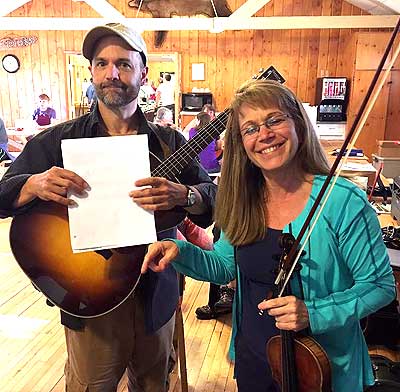 Richard
Gilewitz: This is an arrangement by my guitar teacher of over
forty years, David Walbert who I originally met at the University
of Alabama in 1977. He still lives in Birmingham, is one of the three
inventors of Trivial Pursuit, and to this day pretty much is the most
musical human I've met on the planet. This is his arrangement that
had been lying around for quite awhile and I knew it would be a challenge.
Both Tim and I had to up our game to nail this one just right. David
is almost strictly a classical player but has several stunning arrangements,
which is pretty much simply put, his passion and bag!
Richard
Gilewitz: This is an arrangement by my guitar teacher of over
forty years, David Walbert who I originally met at the University
of Alabama in 1977. He still lives in Birmingham, is one of the three
inventors of Trivial Pursuit, and to this day pretty much is the most
musical human I've met on the planet. This is his arrangement that
had been lying around for quite awhile and I knew it would be a challenge.
Both Tim and I had to up our game to nail this one just right. David
is almost strictly a classical player but has several stunning arrangements,
which is pretty much simply put, his passion and bag!
Tim May: The great guitar arrangement was already in place
and pretty self-sufficient, so I went with mandolin vs guitar, came
up with some harmony parts and a little improv. Mando stays out of
the way more and lets me sort of float around Richard’s parts.
mwe3: What brought on the cover of the Leonard Cohen’s
“Hallellujah” and what did the David Walbert arrangement
bring to your version?
Richard Gilewitz: Once again this is a typical arrangement
by David Walbert and there is always something about his arrangements
where they feel 'chiseled' down to perfection, in this case a very
simplistic form catering to the melody. I'll never forget David once
saying during a lesson, "I don't think a lot of musicians
understand how to effectively use silence in music." This
arrangement almost feels like it desires an 'air' underneath so it
is allowed to breathe.
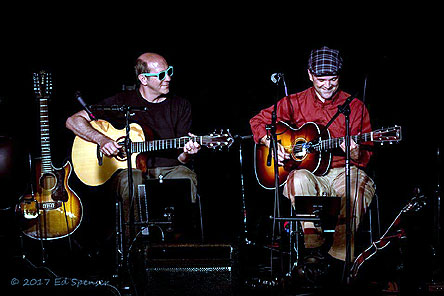 mwe3:
What period does “Have You Ever Seen A Rainbow At Night”
come from? How was it inspired by The Blue Penguins Of Oamaru and
is there also a classical influence on that track?
mwe3:
What period does “Have You Ever Seen A Rainbow At Night”
come from? How was it inspired by The Blue Penguins Of Oamaru and
is there also a classical influence on that track?
Richard Gilewitz: Longer story where the title came from but
in a nutshell I was listening to someone in Picton, New Zealand go
on and on with some story and she suddenly interjected the question
- "Have you ever seen a rainbow at night?" That comment
stuck with me the whole tour and when I was down in Oamaru New Zealand,
home of the Blue Penguin I played a club cleverly titled, The Penguin
Club. 296 penguins came out of the water, waddled over to the club,
crawled under the floorboards, simultaneously puked, and waddled back
to the water. So they deserve a tune!
mwe3: “Can’t Help Falling In Love” is a tune
that just about everyone has heard. What was your approach to it as
the Sharky version has a nice steady, flowing arrangement by
David Walbert. It’s clearly another Sharky highlight.
Richard Gilewitz: Once again, simply put, another typical Walbert
arrangement with air underneath. Restraint. Allows the beauty of the
melody to exist. And why not do a tune that Elvis sang?
Tim May: Great Walbert arrangement decided to go with Resophonic
to again stay out of the way but provide a little sustained vibrato,
harmony, etc...
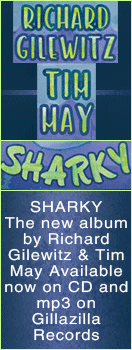 mwe3:
The Sharky version of “Bye Bye Blackbird” is brilliant
as it also brings in the violin of Gretchen Priest-May. What made
you bring in the violin? Seems like a natural sound to add to the
Sharky album sound. When did you first hear that song and how
favorite versions of the song?
mwe3:
The Sharky version of “Bye Bye Blackbird” is brilliant
as it also brings in the violin of Gretchen Priest-May. What made
you bring in the violin? Seems like a natural sound to add to the
Sharky album sound. When did you first hear that song and how
favorite versions of the song?
Richard Gilewitz: I originally got going on this with my Australian
friend Mark Russell. His band toured with Dire Straits all over Australia
playing to over 50 sold out stadiums. He introduced me to this tune
and it was a way for me to learn how to play background rhythm and
let someone else carry the melody. I am a soloist so this was a new
and fun approach, which allowed me to finally have something to bring
to the table when playing with others.
Tim May: Richard, along with Gretchen, my wife and I have done
a lot of playing together, so we wanted to get her on a track. She
grew up playing this tune as a duet with a guitar player in South
Bend Indiana, and it’s always been one of my favorites because
of its somewhat unique harmony. Miles Davis’ version is the one
I heard that really caught my ear. Richard knocked out some strong
jazz rhythm on this one.
mwe3: How about the final track “Little Alex”? Interesting
that is was inspired by a dog Richard met in Australia? God I love
Australia.
Richard Gilewitz: The name of a dog in Brisbane, Australia
and I watched him scurry quickly along the floor doing a dance, his
feet hit carpet... so I included a 'palm mute' to simulate dog feet
on carpet. Then he slid across some tile floor with a panicked look
on his face, hit a table leg, got knocked out. You'll hear all of
that in the tune and, then as he recovered, he seemed like a cartoon
dog getting his senses back, got back to his original dance, added
a dance and at the end took a bow. How could you not write a tune
about that?!



